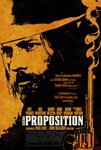The Proposition- ****1/2
 The Proposition- ****1/2
The Proposition- ****1/2“I will civilize this land!” Bellows Captain Stanley (Ray Winstone) in the beginning of the movie. He has just given the proposition of the title, telling Charlie Burns (Guy Pearce) he has ten days to kill his estranged, psychotic older brother Arthur (Danny Huston), or Stanley is going to hang his younger brother Mike (Richard Wilson). But this simple proposition sets off the entire movie, and we realize that killing one brother to save another is the least of the film’s moral dilemmas.
The Proposition opens with a warning that Aborigines may find certain images disturbing. While the treatment of Aborigines is particularly awful, the images in this film will disturb everyone. It continues the popular theme of recent movies like A History of Violence and Munich, in which violence and revenge do not solve problems, but instead create more. In this case, the revenge is because of an event labeled “The Hopkins Outrage.” We are never specifically told what the Hopkins Outrage was; we just receive hints through photographs and dialogue. It reminded me of 70s movies like Chinatown, where the past events weren’t as important as the psychological damage they caused.
The outrage was caused by the Burns gang, and the local town is clamoring for blood. Captain Stanley, a sober man who is horrified at his own slow decline into brutality, is trying his best to balance the needs of the town, personified by mayor Eden Fletcher (David Wenham), and the needs of his family, personified by his wife Martha (Emily Watson). One of the best scenes in the film is a flogging Stanley tries, and fails, to prevent. Rather than focus on the flogging itself, we get shots of the crowd horrified at their own actions. And rather than spray the audience with gore, as in the shocking yet empty flogging scene in The Passion of the Christ, the message is delivered more powerfully through one subtle shot of a man wringing blood out of the whip
Screenwriter Nick Cave delves deeply into the psychological issues of not only violence and revenge (no surprise to those familiar with his music), but the irony of how they turn civilized humans into animals. Cave and director John Hillcoat manage to relocate the American western to Australia beautifully. Hillcoat never tries to out-direct the screenplay, and instead settles nicely into it. He gives us a vast, oppressive outback that manages to out-barren the American west. The long, sweeping shots seem open, yet claustrophobic, familiar and yet strangely foreign. The best example is Stanley’s house, which clones civilization with a small garden penned in by a make-shift picket fence. But the oppressive, baked landscape crowding at the yard seems impossible to keep out. But the scenery isn’t the only interesting change. The Aborigines effortlessly take the place of the Indians, but the whites are almost more interesting. In an American western, they’re all white; here the criminals are Irish, and the soldiers are all British. This adds another interesting level to the themes of oppression and hatred.
I could list off each actor one by one, but there’s no point. There are no bad performances in this movie. The casting is spot-on, and each actor digs deep into their character. The only exception would seem to be Guy Pearce, but since Charlie’s actions and thoughts are entirely inscrutable, it only makes sense that his character is as well.
This review gave me a very hard time, as did a review for another neo-western I saw earlier this year, The Three Burials of Melquiades Estrada. I never did finish a review for that film, and very nearly gave up on this one. Nothing in this movie is easy, and trying to discuss it in a short space is excruciatingly difficult. There is a very telling point in the middle, though, which brings together not only the evil in that time, but in our own as well. Fletcher chastises Stanley for letting his men kill an aborigine, because of the revenge the aborigines will now take on the whites. Fletcher’s solution? “Next time,” he sneers, “kill them all.”








0 Comments:
Post a Comment
<< Home